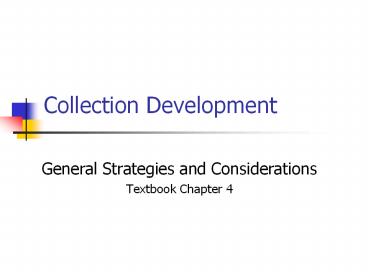Collection Development - PowerPoint PPT Presentation
1 / 17
Title:
Collection Development
Description:
Collection Development General Strategies and Considerations Textbook Chapter 4 * Collection Development Policy Written statement of how the collection will grow. – PowerPoint PPT presentation
Number of Views:298
Avg rating:3.0/5.0
Title: Collection Development
1
Collection Development
- General Strategies and Considerations
- Textbook Chapter 4
2
Collection Development Policy
- Written statement of how the collection will
grow. - Provides direction/guidelines for staff Provides
continuity when staff changes. - sets priorities for what is purchased.
- Allows formalized response to community concerns
about purchases.
3
Policy Elements
- Community Profile demographics, service area,
mission. Often just one or two sentences. - Community Needs Assessment more details than
profile focuses on description of services and
how they relate to community - Related to library mission
- Collection goals library priorities for various
aspects of collection often done by category.
4
Collection Goals - examples
- Public Library (Benson Public Library, AZ)
- "The Library maintains a picture book collection
for pre-schoolers and fiction and non-fiction
sections for elementary and high school use. A
reasonable attempt is made to select according to
quality and user demand. We do not select
according to school curriculum, as that is
covered by the school libraries."
5
Collection Goals exampleAcademic Library
(Indiana University - South Bend)
- The primary goal of the collection management and
development activities is to acquire and maintain
the information resources necessary to support
the scholarly and teaching mission of the campus
to support the academic and professional
pursuits of the faculty. A secondary goal is to
provide information resources for the local
community. The resources of the Schurz Library
complement the public and school libraries of the
area with many resources which are not available
elsewhere locally.
6
Policy Elements continued
- Selection Responsibility who selects
- Subject or dept. specialists or centralized
ordering - Selection Criteria
- e.g. topic, reading level, cost, demand, local
emphasis, date, etc. - Specific guidelines for purchases and gifts
including - prioritized categories for purchase
- Areas not collected.
- May include preferred formats.e.g. Collect best
selling NYT fiction titles in e-book format. - Acquisitions procedures and policies
7
Policy Elements continued
- Collection Evaluation and Assessment
- circulation statistics, reference statistics, ILL
fulfillment - Collection policy review and revision
- Weeding procedures (de-selecting)
- Definition evaluation of existing library
holdings for possible replacement, repair,
updating or discarding. - Depends of library mission and scope of
collection - i.e. libraries that maintain historical
collections weed less - Helps maintain relevant, appealing and timely
collection - Allows shelf-space for new items.
8
Weeding the collection guidelines
- M.U.S.T.Y Misleading, Ugly, Superceded, Trivial,
irrelevant for Your collection)
www.cde.ca.gov/ci/cr/lb/documents/weedingbrochure.
pdf - CREW (Continuous Review, Evaluation Weeding)
www.tsl.state.tx.us/ld/pubs/crew/toc.html - Weed It! (weeding dos and donts)
www.wmrls.org/services/colldev/weed_it.html
9
Censorship Collection Development
- What is censorship? the practice of suppressing
or deleting material considered to be
objectionable (textbook p. 105) - Library Bill of Rights
- usually included in collection development
policy - Along with procedures for complaints and request
for reconsideration - Banned Book Week library may have displays
10
Selection vs. censorship (textbook p. 106)
- professional responsibility to be inclusive,
not exclusive, in their collection development
and to refrain from withholding topics because of
their own personal stance on an issue selection
policies might include prioritized categories for
purchase or areas to be omitted in the
collection because few libraries can afford to
buy everything.
11
Selection Tools
- Review Journals Booklist, Library Journal,
Choice, Kirkus, Publishers Weekly - Core Collection Lists Wilsons Library Catalog
Best Books for Young Adult Readers - Other Professionals
- Best Seller Lists
- ALA Lists YALSA http//www.ala.org/ala/yalsa/boo
klistsawards/booklistsbook.htm - Books In Print
12
Online Resources
- Collection Development Training for Arizona
Libraries www.lib.az.us/cdt/ - Resources for School Librarians (directory)
www.sldirectory.com/libsf/resf/coldev2.html - Sample collection development policy
- Tempe Public Library www.tempe.gov/LIBRARY/admin/p
olicies/colldev.htm - Pasadena Public Library www.ci.pasadena.ca.us/libr
ary/collection.asp - How the library decides what to purchase. Large
academic library example - Cornell University
http//www.news.cornell.edu/stories/June07/bookbuy
ers.ws.html
13
Selection of library materials
- Keep up-to-date on publishing trends.
- Read a variety of review publications.
- e.g. Publishers Weekly, Booklist, Choice, etc.
- trends in your selection area/discipline
- Know your collection development statement
- Know your community.
- Every library serves a community
- Circulation data
- Keep up-to-date on current events.
14
Selection Criteria (p.105)
- Authority Who is the author? Who is the
publisher? Is the author qualified to write on
the subject? - Accuracy Would experts generally agree this is
a good source? - Currency How up-to-date is the information?
Does it duplicate something already available? - Scope What subject area does the item cover?
Broad or specific? - Interest Will the item be used?
15
Selection criteria, cont.
- Organization and Format Easy to use? Indexes?
Cross references? Readable print? Strongly bound? - Special Features Illustrations? CD? Maps?
- Cost Are there other comparable, less
expensive, sources? - Impartiality Fair and balanced? If not, are
other viewpoints represented in collection?
16
Selection Resources
- Book Reviews
- Problems time delay number of books reviewed
small press not well represented. - Best Of and Recommended Lists
- Subject Lists/Bibliographies
- Publisher Sources (catalogs)
- Online Bookstores
- Books in Print verify bibliographic
information. - Patron requests
17
Electronic resources
- Database licensing
- Based on library service group and users
- Fluctuating holdings
- ownership
- off-site access issues
- Consortia purchasing
- negotiates contract and reduced rates































